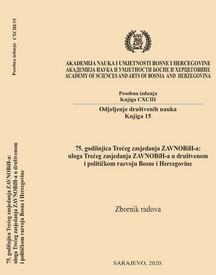PRILOG POLITIČKOJ BIOGRAFIJI AVDE HUME – VIJEĆNIKA TREĆEG ZASJEDANJA ZEMALJSKOG ANTIFAŠISTIČKOG VIJEĆA NARODNOG OSLOBOĐENJA BOSNE I HERCEGOVINE
CONTRIBUTION TO THE POLITICAL BIOGRAPHY OF AVDO HUMO – COUNCILLOR OF THE THIRD SESSION OF THE STATE ANTI-FASCIST COUNCIL FOR THE NATIONAL LIBERATION OF BOSNIA AND HERZEGOVINA
Author(s): Dženita Sarač-Rujanac
Subject(s): Political history, Government/Political systems, Political behavior, WW II and following years (1940 - 1949), Post-War period (1950 - 1989), Politics and Identity
Published by: Akademija Nauka i Umjetnosti Bosne i Hercegovine
Keywords: Avdo Humo; republic; Bosnia and Herzegovina; federation; statehood; ZAVNOBiH; equality; My generation; liberals; dissidents; political marginalization;
Summary/Abstract: One of the councillors of the third session of the State Anti-fascist Council for the National Liberation of Bosnia and Herzegovina (orig. abbrev. ZAVNOBiH; April 26-28, 1945 in Sarajevo), who participated in the preparation and work of the previous two sessions (in Mrkonjic Grad in 1943 and Sanski Most in 1944), was Avdo Humo, a writer from Mostar, an illegal and a professional revolutionary. Humo is undoubtedly one of the most important intellectuals and politicians of the 20th century in Bosnia and Herzegovina. This paper points out the key biographical data following Avdo Humo from his student days. As a graduate of the Faculty of Philosophy in Belgrade, he has been an active member of the Communist Party of Yugoslavia (CPY) since the mid-1930s and also an organizer of anti-fascist resistance during World War II. Humo had great merit in the process of constituting and institutionalizing Bosnia and Herzegovina as one of the six equal republics in federal Yugoslavia. After the war, he participated in numerous prominent political and social roles, both in the Republic and in the federal centre. However, Avdo Humo was politically marginalized and morally disqualified in the context of a strong wave of self-criticism within the League of Communists of Yugoslavia (LCY) in the early 1970s, during the reconstruction of the Republican leadership and the removal of the so-called spring followers and liberals, i.e. significant re-Stalinization of the system. The parting of the League of Communists of Bosnia and Herzegovina with Avdo Humo, Hajro Kapetanovic, Osman Karabegovic, and Cedo Kapor at the end of 1972 followed their sharp criticism of the dominant current, undemocratic relations, unprincipledness, firm-hand leadership, management by a narrow circle of leaders and the more. The Republican leadership assessed them as a synchronized group, as a faction within the League of Communists that cooperates with ”liberals, informers, and bearers of hegemonic tendencies” and that has ”insatiable lust for personal power in realization of dominant influence on the policy of the Socialist Republic of Bosnia and Herzegovina.” The party leadership unanimously assessed their criticism as groundless and stated that their target was the destabilization of the leadership and causing a rift within it.
- Page Range: 175-204
- Page Count: 30
- Publication Year: 2020
- Language: Bosnian, Croatian, Serbian
- Content File-PDF

